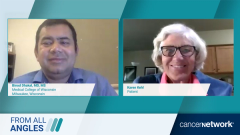
Karen's Advice: What Every MM Patient Should Know
Panelists discuss how patients with multiple myeloma can achieve excellent quality of life with bispecific therapies like talquetamab despite manageable adverse effects, with Karen sharing her advice to embrace treatment opportunities, accept a "new normal," and focus on the meaningful life experiences these innovative therapies enable, including her recent trip to Italy and time with 6 grandchildren she wouldn't have met without these advancing treatments.
Episodes in this series

Treatment Duration and Dosing Optimization
The evolving approach to talquetamab therapy emphasizes individualized treatment duration and frequency adjustments to optimize both efficacy and quality of life. While clinical trials administered the drug every other week until progression, real-world experience has shown that reducing dosing frequency after achieving response can maintain therapeutic benefit while significantly improving adverse effect profiles. Karen's treatment exemplifies this approach, transitioning from every-other-week to once-monthly dosing after demonstrating excellent response. This frequency reduction has been shown to decrease nail changes, skin changes, and taste alterations while preserving treatment effectiveness. The strategy represents a careful balance between maintaining therapeutic benefit and minimizing toxicity that could impact patient quality of life.
Patient Perspective on Treatment Experience
Karen describes talquetamab as the most tolerable treatment in her extensive 16-year journey with multiple myeloma, despite experiencing some uncomfortable adverse effects. She emphasizes that patients must accept a "different norm" for life while living with cancer, acknowledging physical limitations while maintaining an active lifestyle. Her recent 2-week trip to Italy, though requiring some activity modifications, demonstrates the excellent quality of life possible with this treatment. Karen continues exercising and actively engages with her 6 grandchildren, ranging in age from 15 years to toddlers, relationships she credits to the life-extending benefits of innovative therapies that weren't available at her original diagnosis.
Encouragement and Life Perspective
At the age of 71 years, Karen offers encouragement to other patients considering talquetamab, emphasizing its effectiveness and efficiency in her experience. She advocates for a day-by-day approach to living with multiple myeloma, recognizing it as a manageable chronic condition rather than a death sentence. Her survival far beyond the median expectations from 2009 demonstrates the dramatic improvements in multiple myeloma treatment over the past 16 years. Karen expresses gratitude for her treatment results and optimism about potentially exceeding the projected 4-year treatment duration, embodying hope for continued advancement in bispecific antibody therapies.
Newsletter
Stay up to date on recent advances in the multidisciplinary approach to cancer.





































